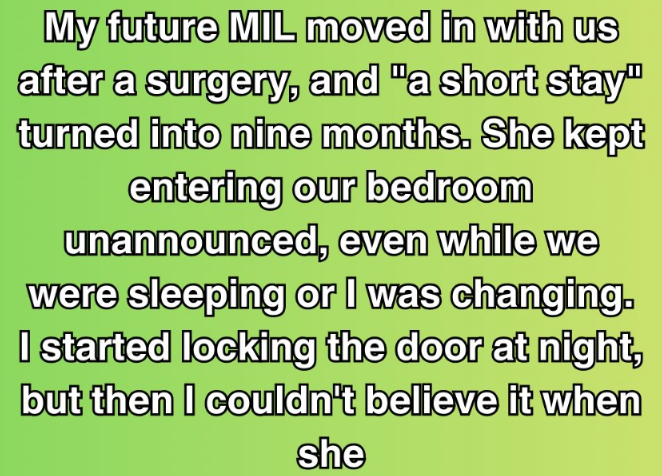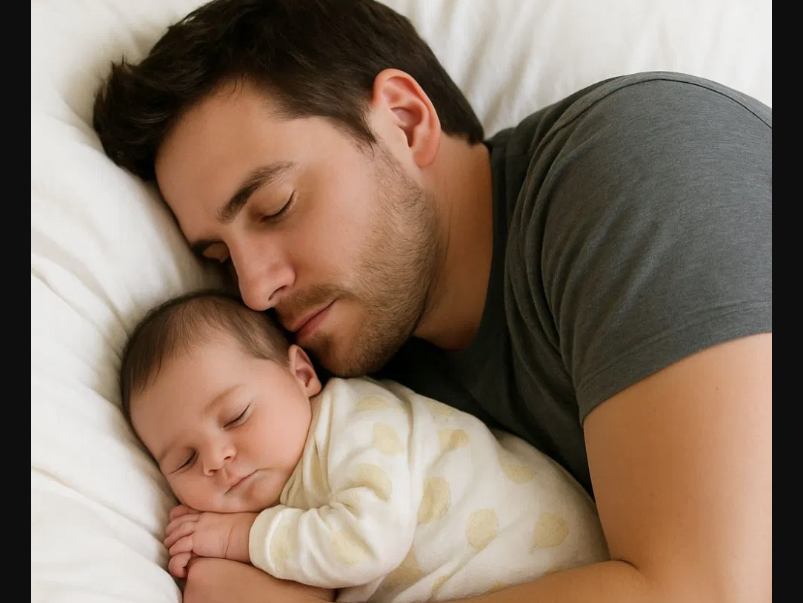My future mother-in-law moved into our home following her knee surgery, with the promise of a brief stay. That brief stay stretched into nine long months. She had a habit of entering our bedroom without knocking, catching us off guard during private moments like sleeping or changing. To regain some privacy, I began locking the door at night. Then, to my astonishment, she requested the spare key.
I was in the kitchen, pouring my morning coffee, when she brought it up. She was sifting through our mail, acting as if the house belonged to her. “I’ve noticed you’re locking your bedroom door,” she said casually. “Can you hand over the spare key? For emergencies, you know.” Her tone was as light as if she were asking for a teaspoon of flour.
I chuckled, assuming it was a joke.
But her expression remained steady, unyielding. “It’s for safety,” she pressed.
I stood my ground, explaining that the locked door was for our privacy. She didn’t take it well. From that point on, her behavior shifted to subtle hostility. Dishes piled up in the sink, seemingly by accident. The air conditioning would shut off when I was home alone. My clothes, freshly washed, ended up in a heap on the floor.
My fiancé, Raoul, tried to mediate. “She’s still recovering,” he’d say gently. “It’s tough for her to adapt.” I held my tongue, acknowledging her recent loss—her husband had passed away—and her ongoing recovery. But this wasn’t adaptation. It was an overstep.
One night, I found her in our bedroom again.
It was 2 a.m. I’d stepped out to use the bathroom, and when I returned, the door was slightly ajar. There she stood, by my dresser.
I flipped on the light. She didn’t even blink.
“I was looking for my heating pad,” she said calmly. It had never been in our room.
That moment changed everything. This wasn’t merely irritating—it was unsettling.
I installed a discreet latch lock at the top of the door. Nothing elaborate, just an extra layer of security, because my trust in her had eroded.
Then I noticed things out of place. My lipstick appeared in the wrong drawer. Raoul’s cologne depleted faster than usual. Stranger still, one morning after we’d both been out, I found the bathroom mirror fogged up, as if someone had been there moments before.
I confided in Raoul, expecting him to brush it off. Instead, he grew quiet.
He looked exhausted, older than his 32 years. “I didn’t want to say this,” he began, “but she’s been… strange since Dad died. She wanders at night. Stares at the backyard for hours. Last week, I caught her folding your underwear in the laundry room.”
I froze. “What?”
He nodded. “I thought she was helping, but… I’m not sure anymore.”
We decided to confront her. Her health had improved; she could climb stairs again. It was time to discuss her moving out, either to her own house, which she still owned, or to a senior apartment. We offered to assist with the transition.
She broke into tears.
Dramatic, heaving sobs. She accused us of abandoning her, claiming I had turned Raoul against her. She packed a bag and locked herself in the guest room for two days, refusing the meals we brought.
Then, silence.
An eerie calm settled in. She stayed in her room, curtains drawn, no longer intruding or stirring drama. I told Raoul we should let things settle, then help her move by month’s end.
But a week later, chaos erupted.
I was on a video call with a client, working from home. The bedroom door was closed but unlocked. Raoul was out getting groceries.
A faint click came from the closet.
My skin prickled. I muted the call and crept over, opening the door slowly.
Nothing.
But something felt wrong. I scanned the room, then spotted it—a tiny red dot blinking on the floor, under the dresser.
It was a camera.
My heart raced as I ripped it free and bolted downstairs.
When Raoul returned, I showed him. His face went pale, like he’d been struck.
We searched the room and found two more cameras—one near the headboard, another by the mirror.
Raoul confronted her immediately. I stood behind him, trembling.
She didn’t deny it.
Her voice was flat. “They’re for safety,” she said. “You never know what could happen.”
We called the police. Family or not, this was illegal.
They found five cameras in total—three installed, two still boxed in her drawer. She was arrested for invasion of privacy and released on bail the same day. Raoul drove her to her sister’s house the next morning.
I hoped that was the end.
But the aftermath lingered for months.
Raoul spiraled, blaming himself for not seeing the signs, feeling he’d failed both me and his mother. I couldn’t sleep without checking every corner of the room, haunted by the thought that she’d watched us, possibly for weeks. The violation made my stomach churn.
A month later, she sent a handwritten letter. It was a half-apology, claiming she was only trying to “feel close to Raoul” and that I had “taken over his life.” She missed the days when he was a child.
I didn’t respond.
Raoul did. He told her she needed professional help and that she couldn’t be part of our lives until she sought it.
Therapy. Boundaries. Accountability.
For a time, I thought we’d cut ties for good.
But six months later, her sister, Lena, called. Raoul’s mother had been attending group therapy regularly, focusing on grief and boundary issues. Lena noted small improvements.
Then, unexpectedly, she sold her house without telling anyone. She sent Raoul a $15,000 check with a note: “I owe you more than I can give. Maybe this helps you start fresh.”
We stared at that check for an hour.
We didn’t cash it immediately.
Over the following weeks, we began to talk. Cautiously. Deliberately.
Raoul met her for coffee, just the two of them, at a neutral location. She brought photos of his late father and spoke about her therapy. She admitted the cameras weren’t about safety—they were about control and fear.
Raoul said she cried through most of the meeting, but it felt different. Less calculated. More genuine.
We made a decision.
We used part of the money to move to a new home. A brighter, quieter place with no shared walls or lingering memories of hidden cameras.
We didn’t cut her off, but we kept firm boundaries.
She never visited our new home. Never asked to.
Instead, we met her for brunch every few weeks in public, light-filled places.
Gradually, being around her felt less suffocating.
She began volunteering at a senior center, saying it gave her purpose.
I’m not sure I’ll ever fully trust her. But I don’t need to.
Forgiveness doesn’t mean erasing the past. It means releasing the need to rewrite it.
The past can’t be changed.
But it can stop repeating—if someone commits to change.
And she did.
Raoul and I married in a small ceremony with close friends. We didn’t invite her but FaceTimed her afterward.
She cried, but this time, it wasn’t about guilt.
People can fracture in hidden ways, twisting love into control or grief into obsession.
But sometimes, they try to heal.
And when they do, we choose how the story continues.
Ours didn’t end in resentment or violation. It ended with a fresh start, a secure lock on our door, and the quiet understanding that healing isn’t guaranteed—but it’s possible.
If you’ve ever navigated a difficult in-law or felt your space invaded, you’re not alone.
If someone shows signs of change, give them space to prove it.
But always hold your boundaries firm.
If this story resonated with you, share it with someone who’s faced a crossed family line. Your support helps keep these stories alive.




